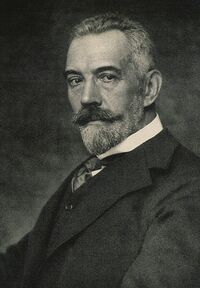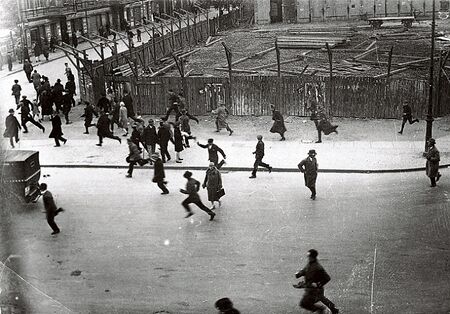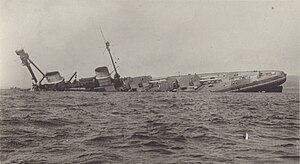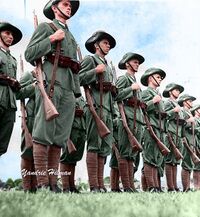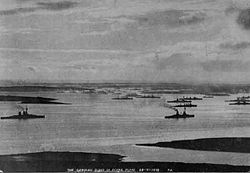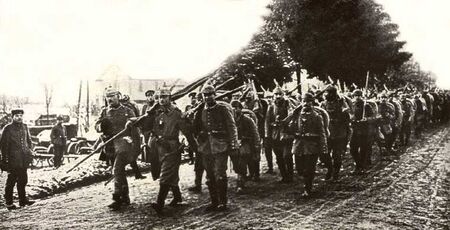Audonia in the First Great War
Audonia's official policy during the First Great War was that of neutrality, guarenteed by its distance from the primary theatre of war and that it was surrounded by Coalition-aligned nations, including active participant Amandine. For much of the war, however, the Audonian military was held at a partially mobilised state in the event that the state was dragged into the conflict, occaisionally being raised to full mobilisation during times of crisis.
Despite its official policy, Audonia supplied and assisted the Galene League both openly and secretly, activities that often brought the state close to conflict with its neighbours, activites that often remain classified to the modern day. Historians often refer to Audonia's situation in the war as 'neutral in name only'.
Pre-war situation
Prior to the outbreak of the war, Audonia was considered by many to be an unofficial member of the Galene League. It held intensely close relations with many members of the League, particularly that of Tyrnica on account of its large Tyrnican-speaking population.
Initially spawned by Audonia's domination in the Rum Gulf following the Continental War in 1936, pre-existing groundwork had already been laid with Tyrnica's material assitance during both it's war of indepdence and the transfer of ownership of Nova Kovaria in 1854 from Tyrnica to Audonia cemented cooperation. Despite Audonia's defeat in the War of the Arabeilline Sea, the nation was considered to possess a still considerable army, which had dissuaded Albrennian and Amandine invasions of the Audonian mainland.
Resentment against the nation's defeat often saw the nation adopt stances contrary to those held by those that had defeated it, including falling in line with the League following its establishment in 1895 whilst much of Marcaeunia adopted pro-Coalition feelings. It was the close relationship that convinced the Tyrnican general staff that the Marcaeunian nations would not pose as great a threat in the war as Audonia and it's allied nations would tie them up before they could make a noticeable difference in the war. Indeed, Albrennian and Amandine war plans included strategies on how to defeat Audonia quickly should it join the war with the League.
The situation in Audonia, however, was one that differed greatly from the ideas of its allies. As early as the formation of the League, successive Audonian governments agreed that joining a Coaltion-League War would be disastrous for the nation, owing to the overwhelming presence of Coaliton-aligned neighbours and the combined weight of the Albrennian and Amandine fleets greatly outmatched that of Audonia's. A series of confidential wargames placed Audonia's best chances as surviving six months into the conflict before its fleet was destroyed to the worst estimates having it last for only two weeks. Though it was agreed the Audonian army was capable of defending the nation, the idea of hosting such a conflict and the projected material cost was not one that lawmakers wished to realise.
Additionally, many considered the fact that Audonia had made no official or vocal pledge to assist the League in any conflict as grounds enough not to participate should such a war break out, however it did not stop the Audonian Assembly from passing the Foreign Enlistment Act 1903, legalising Audonian citizens from enlisting within foreign militaries so long as it was not with nations deemed threatening to the nation.
The Act was generally ignored within the Rythenean portions of Audonia, however upwards of 2,000 Tyrnican Audonians departed Audonia and enlisted in the Tyrnican Armed Forces, the majority often travelling north to King Erich's Land and enlisting there. As a means of inducement, the Audunien Legion was founded in King Erich's Land, ensuring the Audonians remained together and maintained their indepedent culture. Throughout the war, it's thought at least 23,000 Audonian's served in the Legion, it's largest strength at 9,000 in 1910. The repatriation of these volunteers proved to be a diplomatic issue for the Audonian government later on.
Politics
At the onset of the war, the Audonian government was dominated by the Liberal Party, headed by Theobald Strauss, the nation's first ethnic Tyrnican president. Additionally, the Liberal Party was the most popular party amongst ethnic Tyrnicans due to both Strauss's leadership and its liberal platform, but also the expressed sympathies the party held for the League on all levels.
However, despite the sympathies of the party and the national favouring of the League, numerous polls showed that the nation exhibited no desire to join the war, even those taken within Friedland, with only hardcore chauvinists displaying any demand to be actively fighting. Indeed, numerous other issues in the nation preoccupied popular thought, such as growing demand to end child labour that was rife within inner cities whilst racial tensions regarding the recent influx of both the black Aussers but also immigrants originating from outside the traditional home countries of the nation's dominant ethnic groups. Indeed, the Aylos Race Riots had only occurred months prior to the outbreak of war, where white business owners fermented sentiment against a noticeably prosperous black neighbourhood and caused many workers to attack it.
With the National Reserves being called up to keep the peace in both Aylos and the surrounded region, some did consider joining the war as a means of redirecting attention away from issues at home to issues abroad. However, on the advice of Admiral of the Fleet Curtis Ellenby, Theobald Strauss publicly committed to having the nation remain openly neutral in the conflict. Sources have shown that the announcement caught many participants of the Great War by surprise, many of the General Staff of the League found most of their war plans in shambles with Audonia's absence and had to hastily construct new ones that included Albrennia's involvement. Likewise, the Rythenean President, Herbert Longford, is popularly believed to have quipped 'Well, that certainly makes this business simpler', whilst Marcaeunian allies found their transports to Coaltion nations far less impeded than they had anticipated and enabled them to deploy vital battleships elsewhere.
This, however, did not prevent Audonia from standing prepared should a Coalition nation infringe on them, with the military being called up to partial mobilisation, bringing 25,000 of it's 130,000 strong army to readiness whilst much of its Navy remained actively patrolling and enforcing its martime borders. Crucially for the League, Audonia did not join in the boycott of Tyrnican or allied goods, maintaining a vital link of survival for the alliance, both economically and materially.
Neutrality
Audonia's declaration of neutrality was, and remains, a unique moment in Audonian history. The Audonian Constitution makes no refernce to neutrality nor was it the stance of any previous government, whilst popular history displays Audonia as turning in on itself after its defeat in the Arabeilline Sea, however this is hardly the case. Much the opposite in fact, Audonia continued to work in drawing nations awway from the Albrennian-Amandine Axis that had formed following the war's conclusion, actively shaping the policy, both internal and foreign, of nations like Nova Kovaria through a series of unequal treaties. Indeed, the precdent of utilising other nation's to hide its activities in this period set the stage for how Audonia would assist the League. Of course, Audonia maintained its trade with Coalition nations so as to ensure their appearance as a neutral nation in the war, government ministers quicky acknowledging that trading solely with League members would make defending against accusations of being in league with the League impossible.
Violations
Despite its official policy, Audonia was not above floating its own rules to assist those it had considered its allies. Crucially, Audonian merchant vessels were often amongst the very few that reached the League just prior to the outbreak of the war, a role that they would continue to fulfil up until the Battle of Evverkäben in 1912 which forced a blockade on Tyrnica, however it was not uncommon for Audonian vessels to still attempt smuggling runs into the nation to ensure it continued its supply. For decades, it was believed that these shipments primarily consisted of foodstuffs and textiles, intended as a means to lessen the blow of the war on the civilian populace and for Audonia to ensure that much of their harvest foods did not go to waste in storage or effect prices at home too much due to a surplus.
Port Crisis
For more information, visit Audonian Port Crisis
The Audonian Port Crisis of 1909 is generally considered to have been the closest that the nation came to entering the war. The crisis was spawned in the western Hesperian Ocean, with the Tyrnican Vorherrschaft-class battleship, the Särpelgard, firing on a three ship Amandine convoy. At this stage of the war, concepts of the naval convoy had only just begun to be explored, however ideas still had the vessels still travelling in numbers not big enough to guarentee its safety. The Särpelgard fired on the convoy over the course of an hour and a half, succesfully sinking the SS Marie-Laurie and damaging the SS Cahun, however its hunt was interrupted by the arrival of a small Amandine battlegroup comprising of three Augustin-class destroyers and two République-class battleships. Initially deployed on patrol, the were rerouted when news of the Särpelgard's presence reached them. Over the course of thirty minutes, uninterrupted fire criticallydamaged thevessel and necessitated its retreat.
Finding the closest friendly port in Audonia, it travelled there, sending out emergency signals. Picking it up, a patrol of Audonian crusiers and destroyers arrived, granting the Särpelgard entry into Audonian waters and entering a stand off with the Amandine battlegroup. Warning shots by the Audonians were misinterpreted in resulted in a brief clash between the vessels, however incoming Audonian reinforcements, most worringly the arrival of the dreadnought ANS Warspite forced the Amandine vessels to withdraw.
Almost immediately after news broke, tensions between the nations exploded. Amandine immediately declared war upon Tyrnica, the attacks of the convoy proved to be the final straw following frequent attacks on Amandine shipping, and threatened to do the same to Audonia if they refused to release the Särpelgard, whilst League members applauded Audonia for their display of humanitarianism in allowing the stricken ship to take shelter in Audonia. In response to Amandine threats, Audonia initiated full mobilisation of its military, with plans of conscription being discussed if Audonia was forced to defend itself. Shipyards began to be pressed to finish their projects faster to enable more vessels for the Audonian navy to be constructed.
War seemed increasingly likely when Albrennia joined demands for the Särpelgard to be released from port, bringing its own battle group to arms. Audonia vessels began a tense standoff with the combined Albrennian-Amandine ships whilst telegrams and diplomats moved quickly in an attempt to prevent war from breaking off. Most famously, Theobald Strauss met the the Särpelgard's captain, Fregattenkapitän Laurenz Laufel, to negotiate a way to ensure the vessel did not fall under enemy hands and also ensure Audonia remained outside of the conflict. Returning to his vessel, Audonia was issued an ultimatum to hand the ship over or be fired upon, however the ultimatum never came to pass as Laufel ensured the scuttling of the Särpelgard. This action led to a quick deescalation between the nations involved and ensured Audonia's safety, however it had given the Tyrnica, and later the League, yet another enemy to face. With the crew of the Särpelgard now confined within Audonia for the remainder of the war, the closeness with which Audonia came to war certainly alarmed both lawmakers and citizens, whilst the abrasiveness of Albrennian and Amandine ensured any acitivites undertaken to assist the League would be done far more secretly.
Funding
With the League directing much of its industrial output in fighting the Coalition, it left the members with very little room to ensure their economic security during the conflict, despite acts and decrees often limiting prices of raw materials and goods. The funding of the League also came from outside as well, primarily through loans granted to it by Audonia. Initially, these loans were undertaken by private banks in Audonia that were considered sympathetic to the League's cause, however it soon morphed into an unofficial policy to ensure these loans were successfully transferred.
However, after the Port Crisis, it became policy to direct these loans in an underhanded fashion that would enable Audonia to maintain distance from the money and to have plausible denialbility if they were to be discovered. It was then that Audonia utilised its unequal treaties with its neighbours to ensure they arrived. Particularly in the case of Nova Kovaria, Audonia would inject differing amounts of money into certain industries that would in turn pool the resources together and transfer them abroad. These funds eventually transformed into what was referred to as the Archipelago Investment Fund, which from the outside committed itself to repairing and constructing key pieces of infrastructure and supporting islander businesses, while in reality would funnel the funds through the islander economies into seperate League banks to ensure they remained economically viable.
Additionally, dealings would often occur on the King Erich's Land and Audonian border that often entailed the transfer of funds and materials to the Tyrnican colony that in turn would find their way to the mainland. These dealings and dubiously legal activities were considered operations of utmost importance and secrecy, many of the files remaining classified to this day and frequently denied to historians hoping to uncover more in regards to Audonia's role in the war. Indeed, so covert and kept under wraps was the operation that the reality of the AIF was only discovered in the mid 2000s, when relatives of those that had taken bonds from the fund had discovered them and begun to research it. Access to the files had been granted by the Nova Kovarian government before they realised how much it implicated both Audonia and Nova Kovarian politicians, leading to unlooked at files quickly being hidden under the excuse of state secrecy but certainly in response to Audonian pressure.
Intelligence
Initially, many of the activities were undertaken by the Ministry of War, however as the scope of operations began to began to expand and draw in different ministries, it was decided to found a seperate ministry to conduct these affairs. Named the Ministry of State Security to deflect attention away from its actual activities, the Minstry became responsible in not only organising shipments of supplies, the funneling of funds, but it also became responsible in ensuring both the secrecy of these operations, in addition to ensuring other nation's would not be aware of them.
The Ministry became one of the first centralised intelligence agencies in the world and many of its training methods were groundbreaking and remain as standard procedure in many intelligence agencies across the world. Audonia utilised an extensive web of spies in both League and Coalition nations, using figures that were both dissenting on their home nation, but also identified those deemed most corruptable and worked to maintain a steady stream of intelligence, all in order to facilitate the succesful transfer of goods to the League. Testament to the effectiveness of the Ministry is the fact it took many decades after even the Second Great War for the First Great War operations to become public knowledge.
Armed Forces
The Armed Forces of Audonia experienced several close calls with active participants with Coaltion nations, in addition to a decent percentage of it being maintained at a mobilised state to ensure the state's security and capable of a rapid response. At the time, the Audonian military was a fully professional army, a rare feat for militaries at that time, and as such was considered to be a formidable force. It's army was especially well-regarded, standing at 130,000 well trained men and armed with modern weaponry built in country, much of the production licensed from Tyrnica and other League nations, however its strategy in the event of a land invasion was purely defensive. Many likely landing points for Coalition forces had already been identified by ordanance surveys during the War of the Arabeilline Sea as an Axis invasion seemed incresingly likely when its navy was defeated and reinforced accordingly. However surveys undertaken in 1906 realised many of these fortifications had fallen into a state of disrepair during the pre-war period, some had even begun to crumbled. This news greatly alarmed the Ministry of War and, with the agreement of Theobald Strauss, the army undertook a serious repair program, utilising prison labour and work details. Though controversial, it allowed Audonia to repair its defenses to what was deemed an acceptable degree by 1910, however work was stopped when it became increasingly clear that Audonia would not be taking part in the war. Despite this, the stations were still nominally manned by a small garrison with a system to alert reserves in neighbouring towns implemented to allow for a quick reaction should an invasion force be spotted.
These defences were often referred to as 'Plan Red', with its naval presence considered 'Plan Blue'. The Audonian Navy was by no means a small force, numbering at at 67 vessels, of which 8 were the venerable dreadnoughts that dominated naval doctrine at the time. The remained consisted of detroyers and battlecruisers, with personnel standing at 60,000 sailors of likewise professionals. It was this fleet that, in the event of Audonia joining the war, would delay the enemy's advance to the Audonian coast until such time that Audonia was fully mobilised. Audonian doctrine at the time focussed on grand naval engagements, battleship to battleship, so many vessels were designed and constructed with the idea of supporting and protecting their key ships. Surprisingly, Audonia was one of the first nations to fully embrace the concept of submarine warfare, having researched and experimented with the technology extensively, constructing some of the first military submarines in the world, whilst selling them to League allies became a significant aspect of Audonia's shipbuilding economy. It was these silent killers that would act as a deterrent for any would be invaders, as while battleships were easy to spot, dealing with submarines were harder to spot and even more time consuming to deal with, whilst their potential for damage was extreme. By the start of the war, Audonia possessed 20, compared to the next runner up NATION who possessed only 13.
Despite its absence from serious conflicts since the Arabeilline Sea, Audonia possessed a wide network of military observers in allied nations, allowing it to maintain a degree of modernism to its military tactices. It's primary weapon was the (Lewisham Rifle 1898, a license Audonian version of the Tyrnican rifle, a common theme with much of its arsenal. Indeed, the most modern aspect of the army was its arsenal of artillery guns and shells, Audonian doctrine often summed up simply as Firepower Kills whilst the use of mobile and independent squads advanced with support.
The only theatre of war the Audonian military saw action in was that of the King Erich's Land Front in 1911, and only then it was due to accidentally overshooting of Coalition shells and an international incident sparked when Coalition forces mistook the similarly dressed Audonian border guards for Tyrnican soldiers, leading to a firefight. When the truth was discovered, the event was quickly covered up by both sides, with the Coaltion agreeing to pay a small indemnity in apology for the action whiltst Audonia more clearly displayed their flag at posts and wrapped a bright yellow band around their helmets to identify them as Audonian. This simple uniform change also allowed them to facilitate the extration of Tyrnican soldiers that were seriously wounded beyond the means of field hospitals and evacuating them to Audonia, when it was discovered Audonia agreed to detain the soliders once medical care had been administered.
Additionally, the Army's primary purpose other than border security was that off guarding refugee camps from Tyrnicans fleeing the war in King Erich's Land, whilst also offering medical aide in country under the banner of the Red Sword.
Audunien Legion
The Audunien Legion is perhaps the best known example of Audonian assistance to the League in the First Great War. Initially, Audonia maintained a policy that criminalised Audonian citizens enlisting in foreign militaries, however with the growing likelihood of war breaking out between the League and Coalition there too was a demand from Audonians sympathetic to the League cause to fight for it. Indeed, the issue grew so large that during the election of 1900, it threatened the traditional control of the Liberal Party over the Friedland region. Anxious to maintain their seats, the Foreign Enlistment Act 1903 was passed, legalising foreign enlistment so long as it was not within a nation deemed a threat to Audonia or one they were in war with. While largely ignored in Rythenean regions, it was well recieved in Tyrnican and League sympathetic regions. Many have theorised why this was the case, with anthropologist Arthur Conarvon suggesting that whilst Audonians descended Rytheneans had actively fought against Rytheneans in the Revolution and held both political differences and considered themselves wholly unique from Rythene, the case was not so true in Friedland, where they had been taken from Tyrnica by Rythene and many still viewed Tyrnica as a pseudo-homeland for them, seeing no difference in loyalty to Audonia and loyalty to Tyrnica, bolstered by the fact the nations possessed close ties with each other.
The Audunien Legion was officially , in 1905 in St Erich's Land after upwards of 2,000 Audonians surged north across the border under the belief that war was imminent. Formed not only as a means to keep the Audonians, which Tyrnican authorities viewed suspiciously as being motivated largely by romanticism rather than any sincere loyalty to Tyrnica, seperate from proper formations, it also allowed the Audonians to remain closer together and maintaining a high degree of morale. From the onset, the Legion was well-regarded for a high degree of quality of marksmenship, largely a cause of Audonian legislation allowing gun ownership and many of the rural volunteers having had many years of practice with it.
Eventually, as war broke out, the Legion was slowly brought across to Tyrnica proper, by which time they stood at nearly 5,000 men. The Audonians fought across the Auressian theatre, from south Auressia assisting the Palians to the north, where brutal trench warfare reigh supreme. All the while, details of the legion, both exagerrated or otherwise, trickled their way back to Audonia and inflamed popular support for the formation, encouraging others to enlist. Though the border between King Erich's Land and Audonia was officially closed, border guards often turned a blind eye to volunteers sneaking across to enlist, allowing for thousands more to join. By that time, however, serving in Auressia was becoming increasingly difficult, with the encroaching naval blockade and strengthening naval fleet of the Coalition sinking many ships, upwards of half the volunteers never left Marcaeunia, instead fighting firecely during the invasion of King Erich's Land.
Throughout the war, it's estimated that at least 23,000 Audonians had served in the Audunein Legion throughout the war, with a total of 2,400 killed and 9,000 injured. By comparison, only about 2,000 Audonians enlisted with Coaltion armies, often Amandine of Rythene, often these soldiers were held in reserve and acted as either logistics or artillery.
Following Tyrnica's premature surrender in 1913, the issue of repartriating the Legion became an issue for Audonia. Whilst it was certainly agreed they should be transported home, the issue of how reigned. The war was still ongoing in Auressia and the risk of falling victim to sea mines or being attacked was still a present threat in the minds of lawmakers. Additionally, some of the Coalition members demanded that the Legion be tried for acting as unlawful combatants, due to the fact that they did not possess Tyrnican citizenship and were from a neutral country. Though Audonia had no legal issues with citizens enlisting abroad, it was suspected these demands were made as a means of striking back against Audonia for its part in sustaining the League. However, when Audonia refused to lets its citizens be prosectuted, the Coaliton relented as there was no real national feeling for continuing the war or expanding it, especially as the war was clearly coming to its end.
The ANS Windfall was the first to reach Tyrnica to carry the Legion home, by which time they had begun to suffer the same depredations that the Tyrnicans had done, hunger and disease was rife in the surviving Legionnaries and so the hospital ship ANS Saintly Vision was drafted in to treat the soldiers. In all, it took five different ships on several transits to carry those remaining in Tyrnica back to Audonia, however it would be until the official war ended did all the Legion return home as those fighting in Palia had been drafted into the Palia military under the same unit.
Aftermath
The aftermath of the war left Audonia in an uncertain position. Whilst it had come through the war largely untouched and unscathed, it had directed a significant portion of its efforts into supporting the League and ensuring its survival, however with its collapse it left Audonia without many of the allies it had considered to be natural. Tyrnica, it's primary diplomatic partner in Auressia, had turned isolationist, its largest undertaking being the slow repayment of the loans Audonia had given it throughout the league. This new reality would force Audonia to adopt a new strategy to guarentee it's position in the world and its safety, especially with the decline of its neighbours.
Given its still active industrial output did not require any scaling back due to the lack of Total War policies, Audonia undertook a wave of diplomatic missions to nations across the Rum Gulf, pushing its industrial output to meet with growing demand of repair. Additionally, it began to look further east for economic and diplomatic oppurtunities, realising that placing all its bets on a single alliance would prove incredibly hazardous should the alliance collapse. Indeed, Audonia's policy of the 1910s up to the Second Great War was that of the 'Good Neighbour', fostering friendly treaties and relations with countries, showing itself a preferable trade partner compared to the far more antagonistic and interfering Albrennians.
It was these measures that would ensure that Audonia was an active participant in the Second Great War nearly two decades later. Its growing interests in the East, in addition to ensuring the facilitation of its trade globally, meant that the government began to be a primary supporting of uninterrupted maritime traffic, inevitably placing it against Songha and, ironically, having the Audonians and Albrennians fight on the same side of the conflict.
Controversies
Audonia's conduct in the war still remains controversial to this day, primarily amongst former Coalition members. For instance, whilst conducting research for his upcoming book exploring the effects of the naval blockade on Tyrnica, historian August Darren discovered hidden manifests that detailed the shipments contained vital munitions and weapons for Tyrnica that were manufactures in Audonia, licenses that Audonia had procured from Tyrnica prior to the outbreak of the war. Whilst the amont delivered certainly did not have an extreme effect on the outcome of the war, it was calculated it delivered enough to keep three gun batteries firing for three months whilst 3,000 rifles had been smuggled in four shipments. These numbers were based on only a handful of manifests, the true number remains uncertain. With the discovery of the news, Audonian authorities quickly had the documents classified as state secrets and confiscated them, however it did not prevent the news from leaking to the press and embroiling the nation in a resurgence of research into Audonia in the war, quickly eroding the idea that Audonia had been neutral in the war which it had maintained since the end of the war.
Likewise, Audonia's reluctance and secrecy in regards to its operations in the war has led to awkward situations and heated diplomatic relations when old Audonian plots are uncovered by nations it either used to its advantage or used without the knowledge or consent of the host country. Most notably is that of the Wellfleet Five discovered by Albrennia in the 1970s, who had been sending information to Audonia regarding naval movements so as they could safely send much needed supplies to the League but also to pass funds without outside knowledge. Indeed, conspiracy theorists have claimed that revolutions, like that of the August Revolution in Nova Kovaria, was used by Audonia to hide its activities, in the case of Nova Kovaria it was in response to TBA allegedly blackmailing Audonia into assisting the government crackdown on protestors.
Legacy
The legacy of Audonia in GW1 is one of massive speculation. Covered extensively in all forms of media, Audonian historical spy movies are some of the most popular films to have been released in recent years, the dramatising of gun runs anf fund funneling often sparking popular imagination into what else Audonia had done. Ironically, this popularity has caused headaches for the Audonian government as it's been forced to acknowledge dubious undertakings that had only been discovered due to the rise in popularity the genre had.
The Audunien Legion is also a widely celebrated aspect of Audonia's contributions to the war, hailing the volunteers heroism in volunteering to fight in a war thoroughly unknown to them and for their record of bravery. April 18th is often celebrated as Legion Day across Audonia, with previous years hosting parades of surviving Legionaires, however with the death of the last Legionaire, Franz Albrecht, in 1993 the celebration has turned into a day of memorial and rememberance for the Legion. The Legion itself survives today as the First Audonian Regiment, its official nickname being The Legion and possessing the battle honours earned by the Legion during the war. Additionally, it is the only regiment to maintain a ceremonial colonel-in-chief rank, which is filled by the incumbent King of Tyrnica in recognition of the Legion's origins.
Humoursly, a popular internet meme exists on the Audonian internet and forums that big events happening in the world can be chalked up to Audonian actions in the First Great War, from assinging blame for the fall of the Bachelet regime falling in Saint-Baptiste for Bachelet's failure to pay the Audonians for ensuring his rise (which they also attribute to Audonia) to even suggesting the Palheim nuclear disaster as secretly a long ploy by the Ministry of State Security to destabilise their old enemy of Rythene in revenge for the Coaltion's victory in the First Great War.
